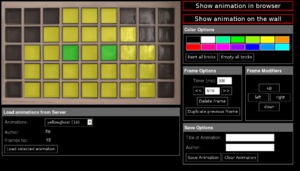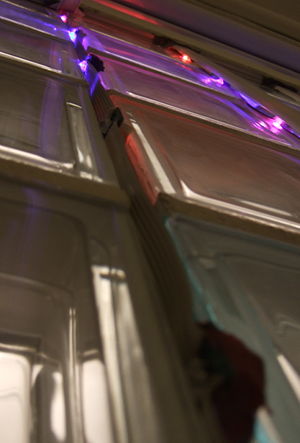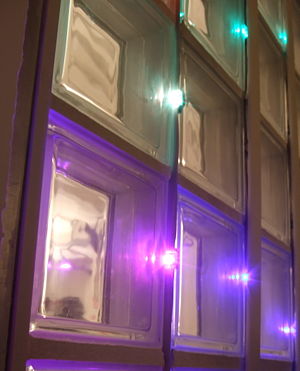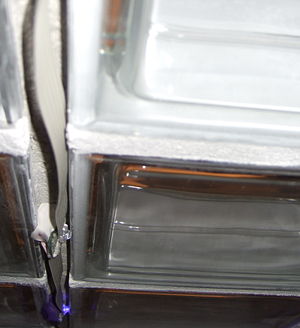Blinkenwall.com/history

Blinkenwall..
- is the wall between our mainroom and the library
- in this wall are 9x5=45 glassbricks installed
- next to every glassbrick there is one RGB-led with a pretty neat chip attached
- these presoldered boards are called Shiftbrite
- they are currently controlled from an arduino this may change soon for something with more computational power :)
- Click here to draw something nice on the wall!!
How
SVN with current software https://whatever.metalab.at/projects/blinkenwall
We just connected the Arduino to a fonera 2202 over serial.
Now its possible to stream data for display to the blinkenwall using your favourite webbrowser.
Lessons learned:
- one can simply connect RX/TX from fonera to arduino
- no stty in default openwrt busybox build
- openwrt building is an fairly easy task
- replacing the busybox binary on a live system during operation is insane and possible! :)
Reference
Who
- Overflo - electronics, soldering, webinterface, fonera setup
- Wizard23 - help with electronics, basic software setup
- Metaz - arduino library software for shiftbrites
- Nex arduino software for webinterface streaming
- Mactux CSS + iphone webinterface
- Natano .C program to decode webinterface streaming files
Blinkenwall v1.5
Now with ~30 fps and network mode! Go to http://blinkenwall.in.metalab.at/ to activate network mode and send your P6 PPM frames to port 1337/tcp. Make sure that all your frames are exactly 146 bytes in size or you'll risk graphics glitches at higher frame rates.
Who
Lessons learned
- netcat has fixed-length 8K RX/TX buffers.
- The Arduino Duemilanove resets on DTS low (the IDE uses that to reset before programming).
- The Arduino Serial class implements an RX ringbuffer of 128 bytes. Patch the Arduino SDK to adjust this to your needs; RX_BUFFER_SIZE in hardware/arduino/cores/arduino/HardwareSerial.cpp.
- mkfifo(1) is neat when opening ttyUSB* devices leads to an Arduino reset.
Applications
- blinkblink -- old-school animations
- blinkenfft -- real-time audio FFT
- mplayer -vo blinkenwall -- watch movies in a stunning resolution of 9x5
Upgrade to Raspi
Georg and WSys replaced the Fonera/Arduino with a Raspi. Networking capability was restored later by sqrt2.
To stream to the Blinkenwall from your computer, open http://10.20.30.26/cgi-bin/togglesocket.cgi and wait for the test frame to appear, then send RGB data for the 45 pixels as before, but without the PPM header (9*5*3 = 135 bytes per frame). Open the URL again to switch back to animations.
Wiring
Since the Raspi got accidentally disconnected and there was confusion on how to wire it up again, here is how:
- Look at the Raspi model B P1 header pin configuration
- Think of the wires of the ribbon cable connecting to the wall as numbered from R1 to R6, where R1 is the red wire and R6 is the blue wire. Connect the orange wires labeled 2 to 5 to the corresponding wires R2 to R5.
- The big power supply has two wires, a dark blue one and a grey one. Connect the dark blue wire to the blue wire (R6) on the ribbon cable.
- Connect the other connector on the dark blue wire to a ground pin on the Raspi, e.g. pin 6.
- Connect orange wire 2 to pin 23 (SCLK) on the Raspi.
- Connect orange wire 3 to pin 18 (GPIO24) on the Raspi.
- Connect orange wire 4 to pin 22 (GPIO25) on the Raspi.
- Connect orange wire 5 to pin 19 (MOSI) on the Raspi.
- Connect the red wire on the ribbon cable to the big power supply's grey wire (labeled 1).
Videos
First Blinkenwall
Blinkenwall after resurrection at Hackathon_8
Photos
 |
 |
 |
Various Links
- Sample effect - https://whatever.metalab.at/user/meta/blinkenwall/WallSample
- SVN with current software https://whatever.metalab.at/projects/blinkenwall
- http://blinkenwall.com
